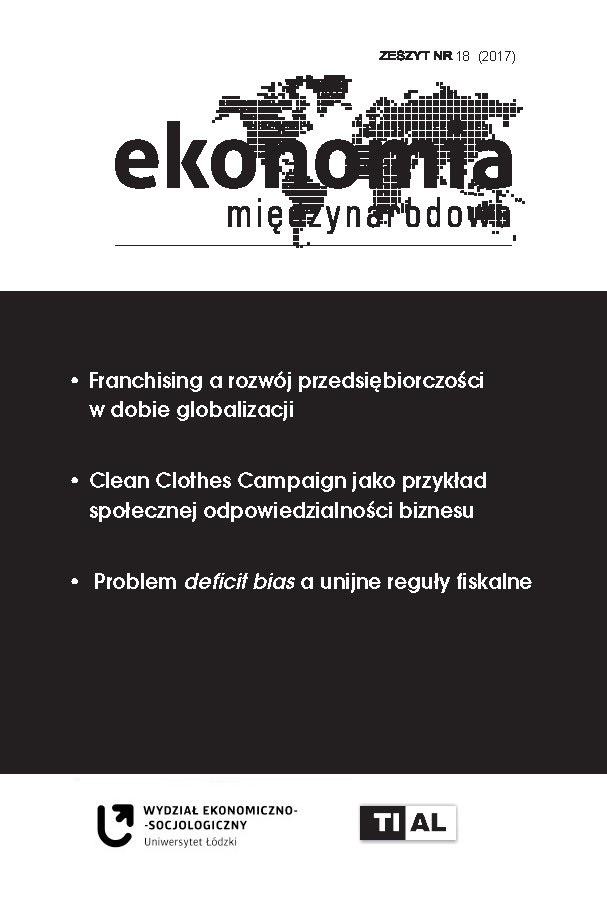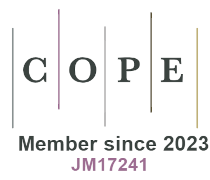Deficit Bias and Effectiveness of the EU Fiscal Rules
DOI:
https://doi.org/10.18778/2082-4440.18.03Keywords:
fiscal rules, Stability and Growth Pact, fiscal policy in the EUAbstract
The aim of this article is to analyse the fulfilment of the Stability and Growth Pact rules by the EU 15 member states in the period 1999–2015. The article also presents the evolution of the EU fiscal rules since their formulation, including, in particular, the influence of the crisis on both meeting the rules by the member states and their substance. The conclusion of the article is that the construction of the rules is the main cause of the ineffectiveness of the pact in eliminating the deficit bias in the EU. In the analysed period, there were years when the member states did not follow the limits defined by the rules (the whole period, but in particular the years before the crisis), years without anticyclical influence of the rules (in fact, the whole period 1999–2015), and years when the rules turned out not to be elastic enough (the years after the crisis). It leads to the overall conclusion that the EU fiscal rules are not the best tool to counteract the deficit bias in the EU.
References
AMECO, Komisja Europejska, http://ec.europa.eu/economy_finance/ameco.
Google Scholar
Calmfors L. (2014), The Roles of Fiscal rules, Fiscal Councils and Fiscal Union in EU integration, Uniwersytet Sztokholmski (Institute for International Economic Studies), Stockholm.
Google Scholar
DOI: https://doi.org/10.2139/ssrn.2642723
Claeys G., Darvas Z. (2016), How to reform EU fiscal rules, http://bruegel.org/2016/04/how-to-reform-eu-fiscal-rules (data dostępu: 12 kwietnia 2017 r.).
Google Scholar
Darvas Z. (2016), The structural budget balance limbo, http://bruegel.org/2016/04/the-structural-budget-balance-limbo (data dostępu: 12 kwietnia 2017 r.).
Google Scholar
Eurostat, Komisja Europejska, http://ec.europa.eu/eurostat/data/database.
Google Scholar
Komisja Europejska (2010), Report on the public finances in the EMU – 2010, Brussels.
Google Scholar
Komisja Europejska (2011), Report on the public finances in the EMU – 2011, Brussels.
Google Scholar
Komisja Europejska (2013), Report on the public finances in the EMU – 2013, Brussels.
Google Scholar
Komisja Europejska (2014), Report on the public finances in the EMU – 2014, Brussels.
Google Scholar
Komisja Europejska (2016), Vade Mecum on the Stability and Growth Pact, Brussels.
Google Scholar
Mourre G., Astarita C., Princen S. (2014), Adjusting the budget balance for the business cycle: the EU methodology, European Commission Economic Papers 536, Brussels.
Google Scholar
Parlament Europejski (2016), Potential output estimates and their role in the EU fiscal policy surveillance.
Google Scholar
Rozporządzenie Rady nr 1466/97 z dnia 7 lipca 1997 r. w sprawie wzmocnienia nadzoru pozycji budżetowych oraz nadzoru i koordynacji polityk gospodarczych (Dziennik Urzędowy Unii Europejskiej, L 209).
Google Scholar
Rozporządzenie Rady nr 1467/97 z dnia 7 lipca 1997 r. w sprawie przyspieszenia i wyjaśnienia procedury nadmiernego deficytu (Dziennik Urzędowy Unii Europejskiej, L 209).
Google Scholar
Schaechter A., Kinda T., Budina N., Weber A. (2012), Fiscal Rules in Response to the Crisis — Toward the “Next-Generation” Rules. A New Dataset, IMF Working Paper, Washington DC.
Google Scholar
Steinhouser G. (2016), Hawks Join Attack on EU Budget Rules, Wall Street Journal, 21.04.2016.
Google Scholar
Traktat o funkcjonowaniu Unii Europejskiej – wersja skonsolidowana (Dziennik Urzędowy Unii Europejskiej, C 202).
Google Scholar
Traktat o stabilności, koordynacji i zarządzaniu w unii gospodarczej i walutowej.
Google Scholar
World Data Bank, Bank Światowy, http://databank.worldbank.org/data/home.aspx.
Google Scholar
World Economic Outlook Database, Międzynarodowy Fundusz Walutowy, wersja z października 2016 r., www.imf.org/external/pubs/ft/weo/2016/02/weodata/index.aspx.
Google Scholar
Wyplosz Ch. (2012), Fiscal rules: theoretical issues and historical experiences, National Bureau of Economic Research, Working Paper 17884, Cambridge, MA.
Google Scholar
DOI: https://doi.org/10.3386/w17884
Downloads
Published
How to Cite
Issue
Section
License

This work is licensed under a Creative Commons Attribution-NonCommercial-NoDerivatives 4.0 International License.









